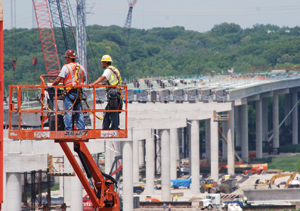Intraparty politics are threatening infrastructure in Illinois, where state legislators remain deadlocked over a mammoth capital bill to fund road, transit, school and other projects. Questions over politics and funding could hold back a plan again in 2009, sources say.

A successful capital bill in Illinois is not a certainty, especially given the topic’s storied debate. Two different versions of a bill called “Illinois Works” were considered in the previous legislative session—a $34-billion package and a scaled-down $25-billion version. The first passed in the Senate with bipartisan support but died in the House when the Democratic leadership blocked it. Like its sister, the $25-billion bill passed in the Senate but did not survive in the House.
The $34-billion version would have relied on the expansion of casino gaming, the partial lease of the state’s lottery and federal matching funds. House Speaker Michael Madigan (D) says he is concerned about expanding gaming and leasing the lottery due mainly to questions about ethics in state leadership, according to Steve Brown, the speaker’s spokesman.
“The need for strict safeguards on how the money is to be spent is because of the track record over the last six years of this administration,” Brown says. “In most cases, they don’t do a really good job of keeping their word.”
Corruption charges have embroiled the administration of Gov. Rod Blagojevich (D). In October, William Cellini Sr. was indicted on federal charges of conspiring with convicted fund-raiser Antoin “Tony” Rezko for allegedly seeking illegal contributions to benefit the governor. The governor is not accused of wrongdoing.
Blagojevich counters that these concerns should not jeopardize the state’s capital plan. “The well-being of the state comes first,” says Clayton Harris III, the governor’s deputy chief of staff. Criticism aside, Madigan “believes there is the need for a capital plan,” Brown adds.
Others have disapproved of Illinois Works because of other proposed funding mechanisms. Advocacy group Transportation for Illinois Coalition calls for $14.4 billion to be spent over five years. The $34-billion bill would provide about $16.5 billion for those needs—$10.9 billion on just roads and bridges. But the plan also calls for diverting $3.1 billion of existing funds in the Illinois Dept. of Transportation’s current budget to pay for tomorrow’s roads by leveraging $7.7 billion of federal matching funds.
Chicago Metropolis 2020, a private nonprofit planning organization made up of local business and political leaders, opposed Illinois Works because it would tap existing funds, according to James LaBelle, deputy director. “It’s easy to pump up numbers to make it look big, but you need to look below the surface to see what is new money and what is existing,” he says. Even so, urgency surrounds the bill if federal dollars are to be used for financing because of the Highway Trust Fund’s looming shortfalls, sources say.
Illinois businesses, planners and politicians have been pushing for a capital bill for years. Even the state tollway supports a capital plan, though its improvements are funded separately through user fees. Previous capital plans included the $6.3-billion “Illinois FIRST” program under Gov. George Ryan (R) in 1999. With matching funds, about $12 billion was ultimately spent. Former Gov. Jim Thompson (R) oversaw the $2.3-billion “Build Illinois” plan in the 1980s.


Post a comment to this article
Report Abusive Comment